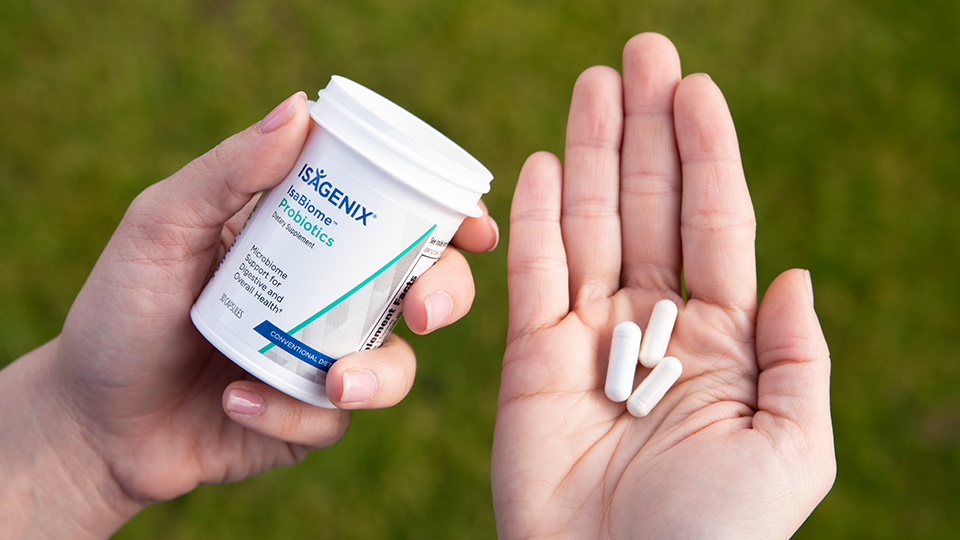Who doesn’t love traveling to far-off lands? There are new cities to visit, exciting people to meet, beaches to explore, mountain trails to hike, and dishes to try out.
Everyone knows that an occasional change of scenery is good for your health, but now you have a scientific reason to take that much-needed vacation: your gut microbiome.
How Traveling Strengthens Your Gut
Traveling to a new destination can be a smart way to de-stress and take your mind off a familiar routine. It turns out that what’s good for your mental well-being is also good for the overall pattern of the trillions of microbes found in your gut.
You add to your gut’s microbial diversity with each new location you visit and person you meet. When you get closer to nature, exercise, or add variety to your diet, you’re unknowingly taking steps to strengthen your gut.
Every time you go somewhere you’ve never been— whether that’s a city, a beach, or the mountains — you introduce your body to a whole new set of microbes (bacteria, fungi, and yeast), adding biological diversity to the ecosystem in your gut.
The Link Between Microbial Diversity and Better Health
Scientists agree that the more diverse your gut microbes are, the more able your microbiome is to respond and adapt to changes in the environment. This can contribute to health benefits like improved digestion, a stronger immune system, and a leaner body weight (1,2).
Alarmingly, staying comfortable at home could be harmful to your health. Studies have shown that even those who have recently migrated to the United States or other developed countries see a rapid and drastic decline in their microbial diversity (1,2).
The largest influencing factor is an unvaried Western-style diet comprised mainly of processed foods. Such a diet is consistently shown to lead to a lack of microbial diversity (1-3). Some research suggests that these missing microbes might result in digestion problems and potential weight gain (1,2).
The ability to influence microbial diversity in the gut could be easier at a younger age. In one small study, scientists found that microbiome changes in children were more apparent than those in adults after a two-week stay in a rainforest village in South America (4).
Probiotics and Digestive Enzymes for Gut Comfort
Get ready for your next trip by packing a quality combination of probiotics and digestive enzymes. A diverse-strain probiotic supplement can help prepare your gut and immune system for the stressors that come with traveling, while an assortment of digestive enzymes can help break down foods that are unfamiliar to your gut. IsaBiome Daily Digestive Health System has both probiotics and digestive enzymes for instant and long-term gut comfort.†
Daily Digestive Health System has both probiotics and digestive enzymes for instant and long-term gut comfort.†
Don’t Leave Home Without IsaBiome
The most important factor in whether a probiotic supplement will work for supporting travel is its efficacy, as reported in a recent meta-analysis of double-blind, placebo-controlled trials (5). IsaBiome is backed by a 3-Stage Viability Guarantee, which includes microencapsulation of probiotic cells, advanced technology packaging, and acid-resistant capsules.
Instructions for Use
General recommendations are to take one capsule of Conventional Diet or Vegetarian Diet IsaBiome Probiotics each morning for a guaranteed 25 billion colony forming units (CFU). During travel, recommendations are to take one capsule of IsaBiome Enzymes at mealtimes for improved digestion and breakdown of foods. You have the option of choosing conventional diet enzymes for mixed meals containing animal and plant-based foods or vegetarian diet enzymes if meals are comprised of mostly plant-based foods.
Because parasitic infections continue to be a risk whenever visiting underdeveloped areas, travelers are cautioned to avoid risky foods and drinks, such as raw and undercooked foods, tap water, or drinks made with ice. Additionally, always wash your hands prior to and after eating or making food.
†This statement has not been evaluated by the Food and Drug Administration. Isagenix products are not intended to diagnose, treat, cure, or prevent any disease.
References
- Heiman ML, Greenway FL. A healthy gastrointestinal microbiome is dependent on dietary diversity. Mol Metab [Internet]. Elsevier GmbH; 2016;5:317–20. Available from: http://dx.doi.org/10.1016/j.molmet.2016.02.005
- Vangay P, Johnson AJ, Ward TL, Al-Ghalith GA, Shields-Cutler RR, Hillmann BM, Lucas SK, Beura LK, Thompson EA, Till LM, et al. US Immigration Westernizes the Human Gut Microbiome. Cell [Internet]. Elsevier Inc.; 2018;175:962–972.e10. Available from: https://doi.org/10.1016/j.cell.2018.10.029
- Conlon MA, Bird AR. The impact of diet and lifestyle on gut microbiota and human health. Nutrients. 2015;7:17–44.
- Biology H, Ruggles K V, Wang J, Volkova A, Contreras M, Noya-alarcon O, Lander O, Caballero H, Dominguez-bello MG. crossm Changes in the Gut Microbiota of Urban Subjects during an Immersion in the Traditional Diet and Lifestyle of a Rainforest. 2018;3:1–8.
- Bae J. Prophylactic efficacy of probiotics on travelers’ diarrhea : an adaptive meta-analysis of randomized controlled trials. 2017;10–3.
The post Why You Need a Gut Microbiome Getaway appeared first on Isagenix Health.
Source: IsagenixHealth.net


You May Also Like
Post-Workout Super Shake
Winter Trail Mix
Apple Spice Granola
IsaDelight Bark With Caramel Brulée Drizzle
Caramel Brulée Cookie Dough Bites
Homestyle Chicken Noodle Soup
BĒA Super Sparkler
Peppermint Mocha Shake
IsaDelight Cashew Butter Cups
Plant-Based Banana Bread
Nature Oat Bake Granola
Nature Oat Bake Isa-Cream Sandwiches
Nature Oat Bake Skewers
BEA Mango Mimosa Slushie
Plant-Based Strawberry Ice Cream
Plant-Based Strawberry Crepes
Plant-Based Strawberry Muffins
Superpower Elixir
Plant-Based Maple Pecan Protein Balls
Immune-Boosting Oats
Celebration BĒA Sparkler
Bone Broth Chicken Gravy
Kale & Sausage Bone Broth Soup
IsaDelight Reindeer Bark
Holiday Charcuterie Board
Leftover Turkey and Vegetable Soup
Protein Chocolate Mug Cake
Vanilla Protein Coffee Creamer
Greens Lavender Iced Matcha Latte
Isagenix Greens Salad Dressing
Everyday Ginger-Infused Cleanse Tea
Choco-Lava Mug Cake